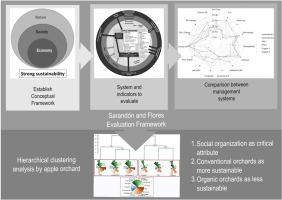Sustainability and the social fabric in commercial apple orchards in Puebla, Mexico
IF 5.4
Q1 ENVIRONMENTAL SCIENCES
引用次数: 0
Abstract
Apple (Malus domestica Borkh.) is a key perennial crop of global economic importance that faces several challenges associated with global change, particularly environmental degradation and climate change. This is due in part to its ecological requirements, including its significant reliance upon managed and wild pollinators that are susceptible to land use/land cover change, as well as climate change. Commercial apple production is performed either following “Conventional agriculture” (CA), “Integrated Pest Management'' (IPM) or “organic agriculture” (OA) production schemes. OA is sometimes described as the preferred strategy to mitigate the vulnerability of apple production in a context of environmental pressures. In this study, we aimed to test the validity of these claims and to identify key sustainability attributes by assessing the sustainability of apple orchards located in Puebla (Mexico). Specifically, we compared the three agricultural management systems described above (“CA” vs. “IPM” vs. “OA'') using a range of sustainability indicators and classification approaches. Our results provide evidence for strong contrasts in sustainability among agricultural management systems, and highlight social organization as the critical attribute towards sustainability in commercial apple production. Our results reiterate the influence of peasant organizations on the effective adoption of sustainable management systems, and the importance of the social fabric to cope with the obstacles towards sustainability faced by agricultural management systems in Mexico. Therefore, the results suggest a need to strengthen agreements and collective actions to increase the probability of success in the implementation of sustainable management systems.

墨西哥普埃布拉商业苹果园的可持续性和社会结构
苹果(Malus domestica Borkh.)是一种具有全球经济重要性的主要多年生作物,它面临着与全球变化,特别是环境退化和气候变化相关的若干挑战。部分原因是其生态要求,包括对管理和野生授粉者的严重依赖,而管理和野生授粉者易受土地利用/土地覆盖变化以及气候变化的影响。商业性苹果生产是按照 "常规农业"(CA)、"病虫害综合防治"(IPM)或 "有机农业"(OA)生产计划进行的。有机农业有时被描述为在环境压力下减轻苹果生产脆弱性的首选策略。在本研究中,我们旨在通过评估墨西哥普埃布拉州苹果园的可持续性来检验这些说法的有效性,并确定关键的可持续性属性。具体而言,我们使用一系列可持续发展指标和分类方法对上述三种农业管理系统("CA "vs. "IPM "vs. "OA'')进行了比较。我们的结果证明了不同农业管理系统在可持续性方面的强烈对比,并强调了社会组织是实现商业苹果生产可持续性的关键属性。我们的研究结果重申了农民组织对有效采用可持续管理系统的影响,以及社会结构在应对墨西哥农业管理系统面临的可持续发展障碍方面的重要性。因此,研究结果表明,有必要加强协议和集体行动,以提高实施可持续管理系统的成功概率。
本文章由计算机程序翻译,如有差异,请以英文原文为准。
求助全文
约1分钟内获得全文
求助全文
来源期刊

Environmental and Sustainability Indicators
Environmental Science-Environmental Science (miscellaneous)
CiteScore
7.80
自引率
2.30%
发文量
49
审稿时长
57 days
 求助内容:
求助内容: 应助结果提醒方式:
应助结果提醒方式:


